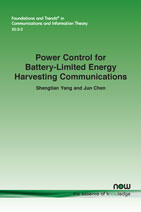Power Control for Battery-Limited Energy Harvesting Communications
By Shengtian Yang, Zhejiang Gongshang University, China, yangst@codlab.net | Jun Chen, McMaster University, Canada, chenjun@mcmaster.ca
Abstract
Power control is often used to ensure efficient resource utilization in communication systems. Its role becomes even more critical in the emerging paradigm of energy harvesting communications due to the intermittency and randomness of ambient energy sources. This monograph provides a review of the fundamental power control policies and their performance analysis in the basic setting of a discrete-time battery-limited energy harvesting communication system with independent and identically distributed energy arrivals. Three different settings, namely, offline power control, online power control, and power control with lookahead, are considered, corresponding respectively to the cases with non-causal, causal, and partial non-causal knowledge of the energy arrival process. A complete characterization of the optimal offline power control policy is presented. In the online setting, the focus is placed on the greedy policy, which is optimal in the low-battery-capacity regime, and universally near-optimal policies, which include the maximin optimal policy, the fixed fraction policy, the two-piece fixed fraction policy, and the locally fixed fraction policy. Finally, power control with lookahead is introduced to bridge offline and online power control, the entire spectrum of optimal policies is characterized for Bernoulli energy arrivals, and the extension beyond the Bernoulli case is also discussed.
Power Control for Battery-Limited Energy Harvesting Communications
This monograph provides a review of the fundamental power control policies and their performance analysis in the basic setting of a discrete-time battery-limited energy harvesting communication system with independent and identically distributed energy arrivals. Power control is often used to ensure efficient resource utilization in communication systems. Its role becomes even more critical in the emerging paradigm of energy harvesting communications due to the intermittency and randomness of ambient energy sources.
Three different settings, namely, offline power control, online power control, and power control with look-ahead, are considered, corresponding respectively to the cases with non-causal, causal, and partial non-causal knowledge of the energy arrival process. A complete characterization of the optimal offline power control policy is presented. In the online setting, the focus is placed on the greedy policy, which is optimal in the low-battery-capacity regime, and universally near-optimal policies, which include the maximin optimal policy, the fixed fraction policy, the two-piece fixed faction policy, and the locally fixed fraction policy. Finally, power control with look-ahead is introduced to bridge offline and online power control, the entire spectrum of optimal policies is characterized for Bernoulli energy arrivals, and the extension beyond the Bernoulli case is also discussed.
